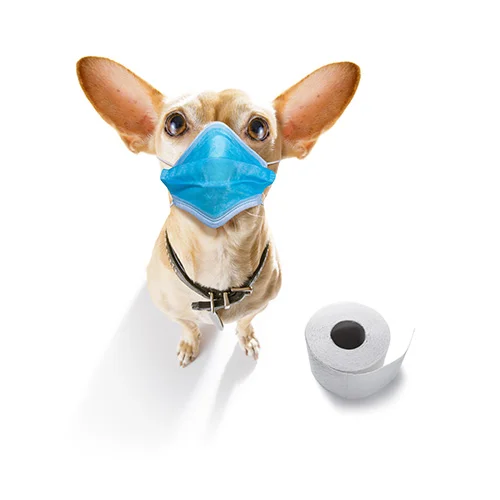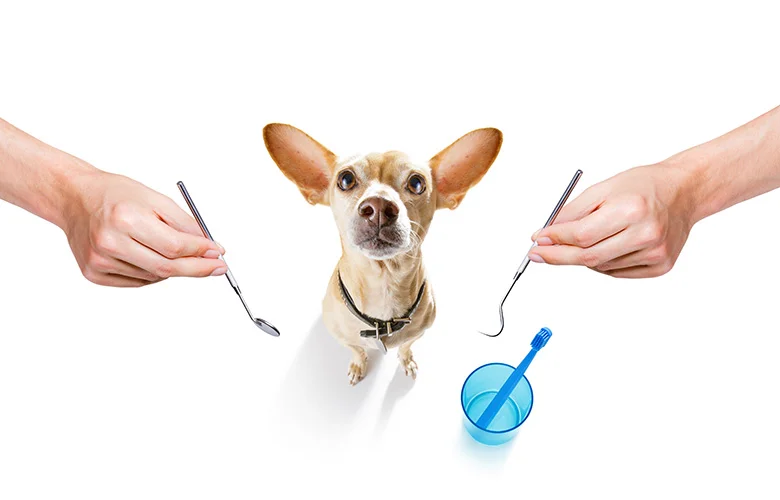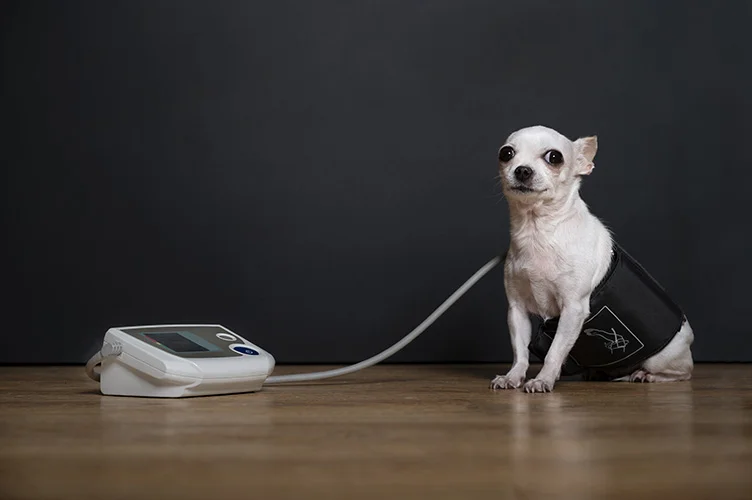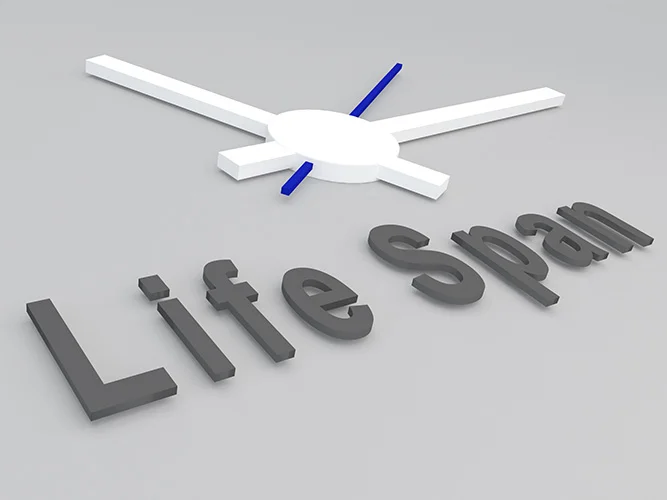Common Chihuahua Health Issues

A small dog with a big personality – that’s a chihuahua. It is also the smallest of all 155 American Kennel Club (AKC) dog breeds weighing no more than 6 pounds. A national symbol of Mexico, these amusing “toy dogs” stand among the oldest breeds of the Americas, with a lineage going back to the ancient kingdoms of the pre-Columbian era. Furthermore, chihuahuas also get along well with the family and make for an excellent apartment dog.
Chihuahuas are generally healthy amongst other breeds of this size. They also outlive most canines, big and small. However, it can also be plagued with health concerns. This article takes you through the common health issues a chihuahua may face, symptoms, and life expectancy of this breed.
Keep in mind that your chihuahua is not likely to face any of these illnesses, but it pays to be aware of them.
Do Chihuahuas Have a Lot of Health Problems?
Chihuahuas are generally a healthy breed and can outlive most dogs. They are one of the rare breeds that have the longest lifespan averaging at 20 years.
However, their small size attributes to a lot of health problems. Furthermore, they are prone to breed-specific health issues. Despite that, they are resilient when it comes to illnesses.
Common Chihuahua Health Problems

Most of the health issues of a chihuahua are genetic and related to the particular breed. And as such, they have quite a few illnesses, but not all are life-threatening. And it doesn’t mean that all chihuahuas get them. Your pet may be more at risk for the below-mentioned diseases. Here are the common health problems chihuahuas are predisposed to:
Spinal Injuries
Injuries are the leading cause of health issues among small dogs, particularly chihuahuas. Chihuahua likes to follow their owner around and often shadow around. Due to their fragile nature, even minor accidents can cause serious injury.
Spinal injuries occur with dogs that play with larger dogs. An acute spinal injury causes nerve damage leading to paralysis. It may also cause spinal disc damage, which puts your chihuahua in pain and lots of it.
The latter is also called Intervertebral disc disease or IVDD. In serious cases, your pet may become paralyzed or lose motor functions in certain parts of the body. Call your vet if he is
- Unwilling to jump
- Cries for no reason
- He lowers his head when you pick him up
He may be in severe pain. Depending on the severity, your vet may suggest surgery.
Canine Distemper
Chihuahuas are very susceptible to viral illnesses such as distemper. Unfortunately, it is rather contagious and transmitted between canines through the air. Also, it doesn’t have any cure either. Hence it is all the more important to get your pet vaccinated. The common signs of canine distemper include:
- Vomiting
- Diarrhea
- Lethargy
- Runny nose
- Red eyes
- Coughing
- Lethargy
- Heavy Breathing
- Temperature
At the onset of symptoms, you need to contact your vet right away. However, do not take your chihuahua to the vet without an appointment. Your vet will notify you after making arrangements such that other dogs do not get infected.
Patellar Luxation
As the name indicates, patellar luxation is the dislocation of the kneecap. It is a common hereditary condition among chihuahuas. There are different levels of dislocation depending on where the patella resides.
Patella consists of three parts: thigh bone, calf, and kneecap. For a dog with this condition, the kneecap dislocates quite often. The symptoms of luxation include:
- Varying pain degrees
- Abnormal gait
- Lameness
- Immobility (in worst cases)
If it’s one leg, your dog can pop it back into place by kicking his leg sideways. Depending on the severity, the treatment varies. In manageable cases, physical therapy can adjust his gait. For severe cases, corrective surgery is the only option. Whatever it is, they can lead a normal life.
Tracheal Collapse
Collapsed trachea is one of the common conditions seen in “toy dogs” like the chihuahua. The trachea is made of rings of cartilage. This structure provides strength and flexibility to the trachea. However, in chihuahuas, the cartilage is weak and prone to collapse when the dog inhales.
This condition also leads to a narrow windpipe. The symptoms include:
- Goose-honk cough
- Gagging
- Difficulty breathing
As the condition worsens, the airways thin, making it difficult for your pet to breathe. In advanced cases, the lack of oxygen can affect other organs.
As for treatment, vets prescribe bronchodilator drugs for mild to moderate cases. As the severity increases, you may have to resort to surgery. To prevent collapse, it is recommended not to use collars for chihuahuas. Instead, go for harnesses to protect their fragile throat and airway.
Dental Disease

Dental disease affects more than 80% of chihuahuas before two years of age. Due to their small heads, they experience teeth overcrowding. It makes it easy for food to be trapped between the teeth resulting in plaque. If left untreated, results in gum disease, periodontitis, and premature tooth loss.
Besides that, chihuahuas also have weak teeth. Moreover, some are born with very little enamel. Hence prone to rot and cavities, not to mention bad breath.
Chihuahua can also retain their baby teeth well into adulthood. This condition is called deciduous canine teeth, where the adult teeth develop askew. Unless pet owners maintain dental hygiene, your dog could lose not only its teeth but also its life. In addition, dental issues often affect the joints, kidneys, liver, and heart.
Hypoglycemia
Hypoglycemia, also called low blood sugar, is one of the most common health conditions seen in chihuahuas. A hypoglycemic attack can cause issues in the nervous system leading to seizures and sometimes coma.
Unfortunately, these attacks come without any warning. Sometimes your dog may show any of the following symptoms:
- Lethargy
- Tremors
- Weakness
- Restlessness
Even a mild case can escalate quite fast, resulting in permanent brain damage. Hence it is advised to take quick action since this is a medical emergency. Therefore, the best treatment for Hypoglycemia is to take necessary precautions and avoid it at all costs.
Shivering
While shivering isn’t a medical issue, most dog owners are worried when they see their pet shiver. However, shivering is pretty common among chihuahuas. The reason being, this dog breed doesn’t have much fat under its skin.
Furthermore, chihuahuas tend to have a hyperactive metabolism. As a result, they are losing their body heat all the time. Hence they tend to shiver much more than other dog breeds. However, it may also be a sign of a more severe problem. While this is not a concern, you may want to contact your vet if you notice something abnormal.
Heart Disease
Heart diseases are the leading cause of death in chihuahua. The common heart defect is the weakening of heart valves such that it no longer closes tight. This results in the book leaking through the valves, causing a heart murmur. However, if detected early, it can be brought under control with the help of drugs.
Apart from that, they are also susceptible to “Patent Ductus Arteriosis.” In chihuahuas with PDA, the valve that carries blood to both the parts of the heart doesn’t close as it should. Hence excess blood is carried to the lungs resulting in fluid buildup and heart strain. The symptoms include:
- Coughing
- Weight loss
- Fatigue during exercise
- Weakness in hind limbs
- Shortness of breath
Another heart condition often sees in small breeds such as chihuahua is a chronic valvular disease. In a dog with this condition, leaf-like valves grow thick and go out of shape. As a result, it doesn’t close well, causing reduced valve function and cardiac output.
The most obvious symptom is a loud heart murmur in the left side of the chest. This condition is degenerative and progressive. If not treated at the right time, it can advance into congestive heart failure.
Pulmonic Stenosis
Pulmonic stenosis is a congenital heart disease where the valve is malformed. This causes the heart to work harder to pump blood throughout the body. As a result, sufficient blood doesn’t flow to the heart.
Depending on the intensity of the condition, the treatment varies. Mild cases require dietary changes, while advanced cases need heart surgery. Undiagnosed, pulmonic stenosis can be deadly since the heart can fail under stress. The symptoms include:
- Fainting
- Exercise intolerance
- General fatigue
Hip Dysplasia
Hip dysplasia is one of the most common conditions seen in chihuahuas. It is often seen in larger breeds where the puppies grow rather fast into their bodies. In chihuahua, however, its fragile frame is a cause of dysplasia. Any injuries that happened in their youth manifest as hip dysplasia when they grow older.
This condition often presents as displacement between the hip joint and thigh bone. Depending on the severity, your dog may need no treatment or corrective surgery. The symptoms include:
- Lameness
- Abnormal gait
- Varying degrees of pain
- Difficulty walking
Hydrocephalus
Chihuahuas have a soft spot on the top of their head called a molera. While this is a characteristic of chihuahuas, a large molera is cause for concern. This condition is called hydrocephalus. It happens when the cerebrospinal fluid accumulates around the brain.
Hydrocephalus is seen in chihuahua puppies nine months of age or younger. The signs of hydrocephalus include:
- Swollen head
- Listlessness
- Lethargy
- Grogginess
- Deficient coordination
Dogs affected by hydrocephalus can have:
- Partial or full blindness
- Dementia
- Seizures(in worst cases)
- Death
Chihuahuas with mild hydrocephalus can live into adulthood and lead a normal life.
Obesity
According to the “American Kennel Club,” a chihuahua should weigh no more than 6 pounds. Unfortunately, obesity is a critical health issue among dogs of all breeds. It leads to many illnesses, including heart disease, arthritis, cancer, and back pain. Apart from that, obesity can worsen joint problems and metabolic and digestive disorders.
The primary reason for obesity is the doggie treats and leftover food. While it is difficult to refuse a treat, they are better off with a walk or a game. Not only is it safer, but you’d also get to spend some quality time with your dog.
Eye Problems
Chihuahuas develop a host of eye problems, of which some are inherited. If not treated right away, they can lead to blindness and can be much painful.
Glaucoma, an eye disease found in humans, can also affect your dog’s eyes. It is a painful eye condition that leads to blindness if not treated at the right time. The symptoms include:
- Watery eyes
- Redness
- Bluing of the cornea
- Squinting
- Enlarges and swollen eyes (advanced condition)
Another eye condition often seen in chihuahuas is dry eye. A chihuahua with a dry eye has reduced secretion by tear glands hence cannot keep the eye moist. This leads to itchy eyes and infections. The symptoms include:
- Dull and dry eyes
- Thick discharge
- Squinting
- Pawing at the eyes
While this is a painful eye disease, it is also treatable. Your vet will prescribe an ointment which you would have to apply for the rest of your dog’s life.
Senior chihuahuas are also affected by cataracts, a common cause of blindness. A chihuahua with this condition will have an opaque and cloudy lens instead of a clear lens. Surgery can remove the cataract and restore his eyesight. However, few pets may learn to live with the blindness and adjust to the new normal.
Liver Problems
Chihuahuas are prone to liver problems, in particular the Portosystemic Shunt. In this condition, a part of the blood supply to the liver goes around it. This deprives the liver of the much-needed blood necessary to grow and function properly.
A dog with a portosystemic shunt loses the ability to remove toxins from its body. You’ll see symptoms such as:
- Stunted growth
- Seizures
Treatment ranges from medication and a special diet to surgery in advanced cases.
Kidney Stones
Kidney stone is common in older chihuahuas, especially males. It is a small stone-like formation made of calcium in the kidney and bladder. Over time they can cause a lot of pain to your dog. The symptoms include:
- Bloody urine
- Difficulty urinating
- Intense pain
Generally, the stones can pass out on their own. However, if your chihuahua has too much difficulty when trying to urinate, you may want to consult with your vet. In rare cases, the stones cause blockages resulting in medical emergencies.
How to Keep Your Chihuahua Healthy

While they are at risk for the above conditions, chihuahuas are generally healthy. As long as you treat them at the right time, they can live a long and full life. In order to have a thriving dog, you need to ensure a healthy lifestyle for your chihuahua. Here are a few steps you can take to ensure that your chihuahua is healthy.
Give Him the Right Food
Chihuahuas are tiny dogs with a playful nature. To keep up the energy, you need to feed them with high-quality food. Any dry food with 30% protein and low in salt is perfect for them. However, you may have to feed them in small quantities multiple times a day. This is because their digestive system cannot handle a lot of food in one sitting.
Chihuahuas also have the tendency to become obese, so avoid overfeeding them. Consult with your vet and decide on a diet regimen based on his activity level. You should also avoid human food, especially coffee, chocolate, onions, and garlic.
Groom Your Chihuahua
Chihuahua is of two types: the long-haired and smooth coat. The grooming needs also vary depending on the coat. The former requires frequent grooming three times a week with a pin brush. This gets rid of the loose hair. For a smooth coat, weekly grooming with a soft-stiffened brush is sufficient.
Ensure that you clean the ears, trim the nails, and brush his teeth. Moreover, bathe him with a dog-safe shampoo every two months. Use lukewarm water for bathing him and drying him with a towel soon after.
Chihuahua is prone to a lot of dental problems. Ensure that you brush him right from the puppy stage so that he is not averse to brushing.
Ensure Regular Preventative Care
The first step of preventative care lies with you. Check its body for any abnormalities during grooming. Contact your vet if you see any swelling, redness, or swelling. Besides that, ensure that your chihuahua is vaccinated with the recommended vaccines.
Annual visits are crucial for chihuahuas. Even if they are healthy, the vet will log his height and weight to log the aging process. In addition, your vet can catch many of the illnesses mentioned above early on during the annual visits.
Excercise Your Chihuahua Daily
For such a tiny animal, your obedience training class is blessed with abundant energy. It has enough energy to run and play the whole day without getting tired. Due to their nature, they can take short walks but not strenuous exercises. For example, a walk around the block is too hard for them.
All pets require training and your chihuahua is not an exception. However, they are challenging to train. You’ll need a regular and consistent training schedule if you are to train him. Having said that, the chihuahua is also a fast-learning dog. Enroll him in a puppy kindergarten class or an obedience training class for training.
How Do I Know if My Chihuahua Is Healthy?
In addition to the annual visits to the vet, here are some indicators of a healthy dog.
- Shiny coat: A healthy dog will have a shiny coat due to the natural oils. Licking, scratching, or chewing could be signs of skin allergies and inflammation.
- Fresh breath: A clean-smelling breath is the sign of the absence of tartar buildup.
- Consistent weight: Obesity is the leading cause of health concerns in chihuahuas. In the same line, your pet should also not lose weight, as it can be a sign of an illness.
- Regular bowel and bladder movements: Changes in the bowel and bladder movements can indicate health issues.
- Alert: Chihuahua is generally quite active. If your dog has any sudden changes like sleeping more or disengaged, it may also indicate a health issue.
- Clean ears: Your dog’s ears should be devoid of wax buildup, discharge, or smell.
What Is the Life Span of a Chihuahua?
Much like the other toy breeds, chihuahua may look small and frail. However, they are spirited and feisty, to say the least. The life span of a chihuahua is between 15 – 20 years, much more than the average life expectancy of dogs. Generally, small breeds have a longer life span than larger dogs. It also helps that chihuahuas are quite healthy compared to other breeds.
What Do Chihuahuas Usually Die From?

The leading cause of death in chihuahuas is cardiovascular disease. 18.5% of the little dogs died due to heart disease. It is most common among adult dogs over the age of 14.
Apart from that, trauma and infection are also the cause of deaths amongst chihuahuas. 16.8% died due to trauma, and 10.5% due to infection. Being small breed dogs, they are susceptible to trauma, including accidents and falls.
Conclusion
Chihuahuas have a long life span of almost 20 years. They are sassy, loving, and feisty. For a generally healthy dog, chihuahuas are plagued with several health problems. On a positive note, most of them are manageable as long as you treat them early. The older a chihuahua, the more illnesses it will face.
As long as you can ensure a healthy lifestyle, your dog is less at risk of the aforementioned conditions. Be informed, be aware, and be diligent; and you can mitigate any risk to the health of your furry friend.
In Tucson, Santa Cruz Pet Clinic is a world-renowned and trusted veterinarian that you desire for keeping up with your pet’s vaccinations at the proper time to ensure its health. Contact us today to schedule your pet’s vaccinations and check-ups.
